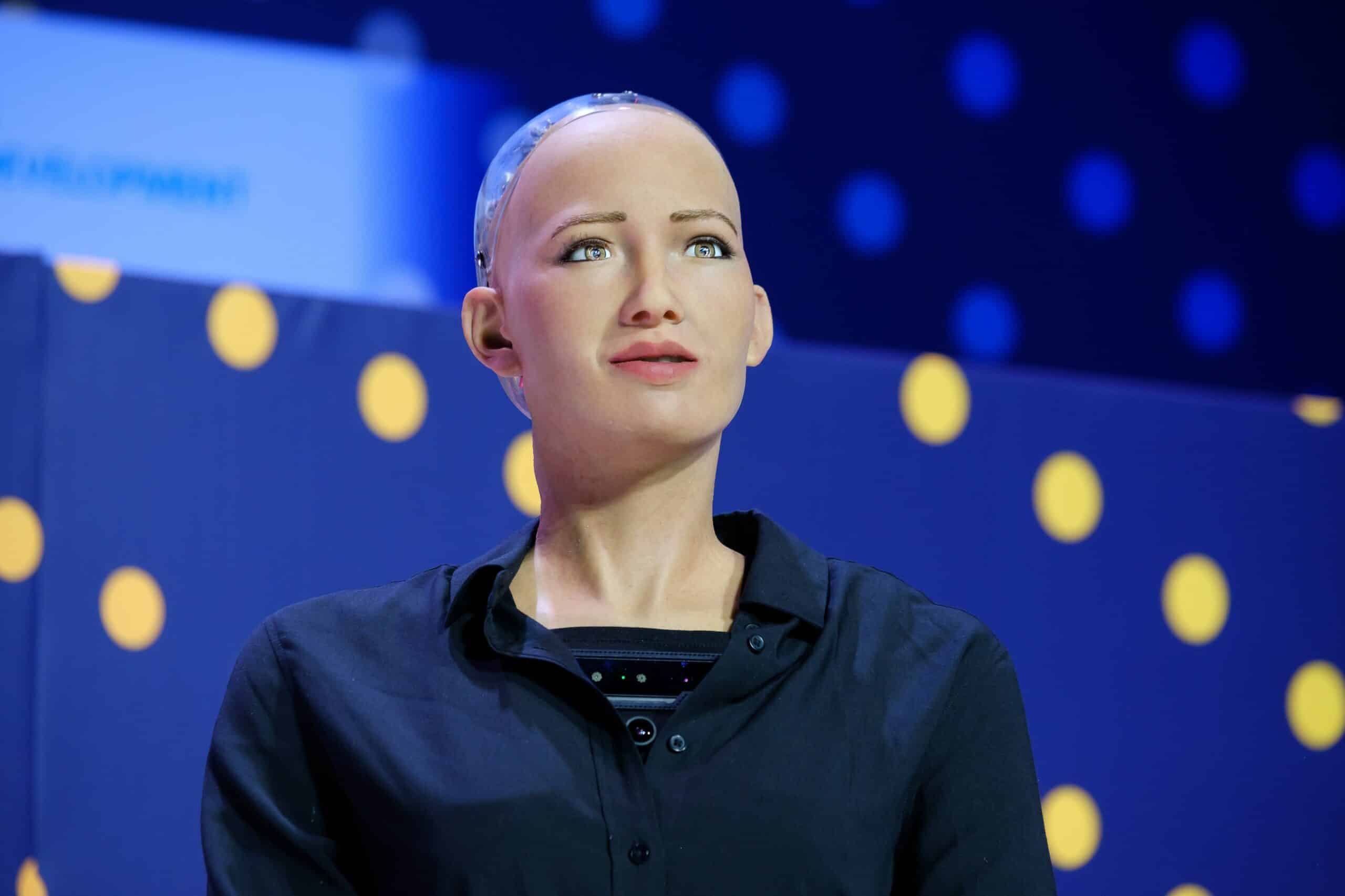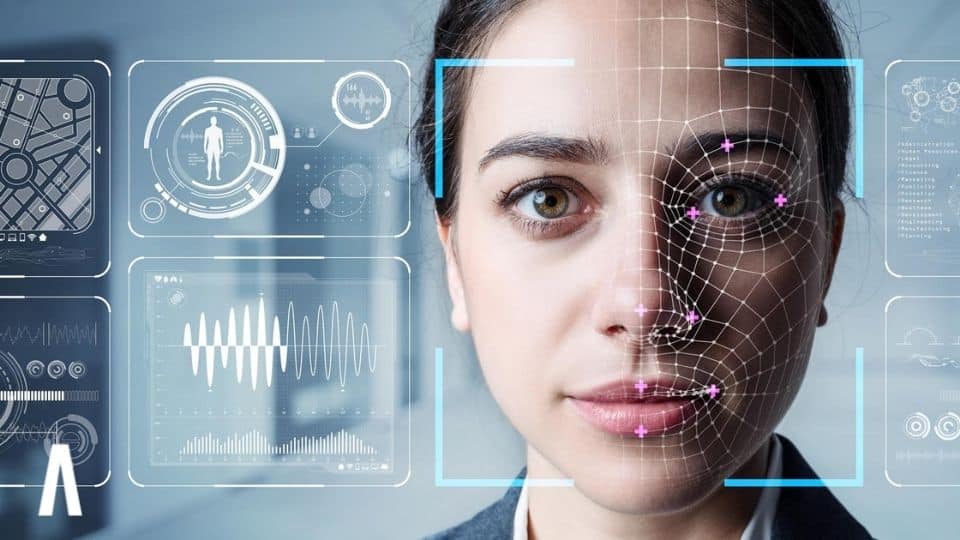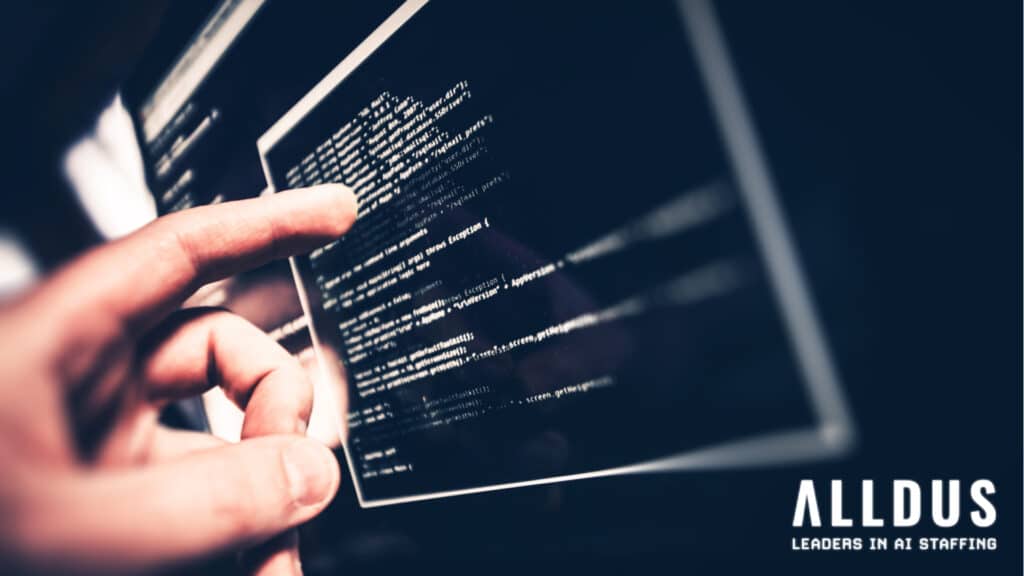Sophia: The Future of AI?
Blog | February 25 2021 | Alldus Recruitment
At the annual RISE tech conference in 2017, two speakers took to the stage to debate the future of humanity. In a light-hearted event, the panel discussed the concepts of consciousness, ethics and empathy (even pausing at one point to break into song). However, this was no ordinary debate.
Despite pondering Philosophical concepts that humans have been debating for centuries, both the speakers were robots.
Sophia, the star attraction of the conference, is the brainchild of David Hanson (Founder of Hanson Robotics). Their most human-like Robot to date, Sophia personifies Hanson’s dreams for the future of AI. A future in which she will be deployed en masse to assist in a number of tasks, from monitoring patients’ vitals in Hospitals to tackling loneliness in care homes.
Is this dream grounded in reality or more reminiscent of the sci-fi writings of Isaac Asimov?
Since first going live in 2016, Sophia has had a busy schedule. From numerous talk show appearances (Tonight with Jimmy Fallon, the Today Show and Good Morning Britain to name a few) to Conference speeches across the World, the humanoid-robot has captured the imagination of the public.
She even became the first Robot to be granted Citizenship by a sovereign Nation at Saudi Arabia’s Future Investment Summit in 2017. However, this move was less a reflection of Sophia’s sentience and more about Saudi Arabia embracing innovation, having only recently lifted the ban on Skype and WhatsApp.
This deployment of Sophia for PR wasn’t an isolated event either. She has since been used to promote smartphones, video games and even used her official Twitter account to advertise tourism in Dubai – leading to charges from some quarters that she is destined for a career as a marketing tool.
The Future of AI?
Hanson has made no secret of his ambitions for Sophia. To some, she represents the latest iteration of AI, part of a continuing process that will ultimately culminate in Artificial General Intelligence (AGI). AGI is the hypothetical ability of a non-human agent to master any intellectual task in the same way a human can – rather than specializing in a specific function. Deep Blue, for example, can defeat even the most brilliant human minds in a game of chess, but it would be of little use to anyone outside of that setting (therefore it does not display general intelligence).
How close is Sophia to AGI?
Sophia’s AI is made up of several constituent parts, leveraging conversational NLP, neural networks, machine perception and cognitive architecture. Depending on the situation these elements can be combined in different ways, allowing for tailored responses unique to each situation.
For example, Sophia’s machine perception component allows her to interpret data in a way that mimics how we use our senses in the physical world, allowing her to recognize faces and pick up on emotional cues. While this is a huge advancement when compared to some of the previous AI programs we have discussed, it’s still a long way from general intelligence.
Hanson CTO Ben Goertzel has described Sophia as more like a software platform, breaking her down into 3 programs:
- A Timeline Editor – A scripting software utilized for speeches (like as RISE) and answering pre-defined questions. This essentially allows Hanson Engineers to program what Sophia is going to say in a given situation.
- A Chat System – Where Sophia selects an appropriate response to a question based on the context, similar to how Alexa and Siri operate. This requires a greater level of intelligence when compared to the Timeline Editor, but is still constrained based on the library of responses.
- OpenCog – The program closest to AGI. This allows Sophia to learn from past experiences and respond accordingly, grounding her answers in reasoning and logic.
When discussing the OpenCog, Goertzel stated: “The goal is for the Sophia robot and others like her to fully understand everything a human will say”.
Despite these lofty ambitions, it appears we are still a while away from achieving this. Sophia’s open-source code is freely available to view on GitHub, with the consensus view from experts being that currently, she is little more than a chatbot with a human face.
Head of AI at Facebook Yan LeCun doubled down on this criticism. In a public post, he described Hanson’s Engineers as no more than puppeteers, accusing them of deceiving the public into thinking Sophia was capable of actual intelligence.

What does the future hold for Sophia?
Such criticisms haven’t dampened Hanson’s ambitions
In a recent interview with Reuters, he discussed how his team are preparing to ship thousands of robots by the end of the year to help care for people affected by the coronavirus pandemic. It is his belief that Sophia’s human-like appearance makes her the perfect companion for the socially isolated and alone.
2021 will also see the launch of Grace, Hanson’s latest robot. Grace combines the machine perception capabilities of Sophia with machine learning to provide personalized care to patients based on their medical history (something already being done to great effect – although not yet with a human face!)
Since her inception, Sophia has caused much debate in the field of Artificial Intelligence. To some (like David Hanson) she is the future of AI, representing the next step in the pursuit of General Intelligence. To others like Yan LeCun, she is no more than Siri with a human face, a sophisticated puppet controlled by engineers. The truth likely lies somewhere in the middle of these diverging opinions.
Currently, Sophia is far away from achieving artificial general intelligence (a feat that many argue isn’t possible to begin with). However, she does represent the latest iteration of humanoid robotics. Even if Hanson is only partially able to fulfil his grand ambitions, it may not be long before Sophia is a fixture in care homes and hospitals across the world, analyzing patient data to provide tailored medical treatments and utilizing machine perception to combat loneliness.
Whether you sit in the camp of David Hanson or Yan LeCun, Sophia has been the catalyst for much debate about the future of AI, which is no bad thing.
Are you interested in pursuing a career in AI?
Alldus are currently managing a number of Data Science jobs across the US, you can upload your resume today to keep up to date with all the latest roles in your area.
share
related articles
Women in AI: Bridging the Gap
Despite huge advancements in AI research, the field still lags in another key area of societal progress, gender equality. With women accounting for just 22% of professionals in the field, we examine the steps needed to address this inequality and how it would also benefit the technologies themselves
Why SQL is the base knowledge for data science
As a programming language, It's a simple skill to learn, but a very valuable one. A walk in the park compared to Python or R.
Why NLP is the future of E-Commerce
There are great benefits to using NLP in eCommerce. The world of business would be greatly benefited from in-depth insights that are controlled by AI. It will help in increasing customer satisfaction rates, improve the revenue curve & ultimately transform the future of business operations.




